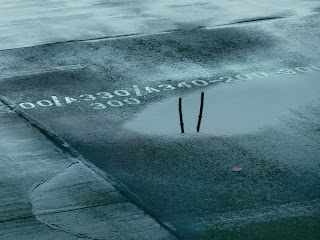I'm reading this morning, in
Soul Without Shame, about self-betrayal: the inner judge's efforts to keep you from your essential self. It's pretty murky stuff, and hard to really put your finger on.
But reading about it helps me realize that I've been experiencing some attacks: I've been having so much fun playing with this series of images that I haven't been putting out my usual soothing pieces (I'm thinking of one I shot last night, in a friend's garden). And some part of me worries that I will lose my readers if I don't get back to showing you "pretty pictures."
This new series is fun, certainly, but it doesn't have the clarity of my usual work: the colors are satisfying, but the end result is busy and confusing, and some part of me thinks that's not okay; wants everything clear and nice. But I'm not sure that's what's driving the concern. I think that what's driving the concern is something a little deeper; something that sees that clarity and niceness as my job, my responsibility. Or -- maybe it's just the gallery's lukewarm response to this work: they're not excited about it, so it won't sell, so it has no value, so why stick with it...
... as in, it's not enough for me to be enjoying it and having fun: I must have a marketable result at the end in order to justify the time spent playing. Ah. Now I see what derails me when I go to art classes and workshops: the pressure to produce something beautiful and saleable undermines the urge to experiment, so when I'm NOT seeing immediate "good" results I get all panicky.
And can you see? That's me feeling I'm not good enough as I am; something in me feels I have to justify my existence and earn approval.
Oy.
This makes me really grateful for my friend Max's words to me last night after our Contemplative Worship Service. We'd been talking about what we pray for, and I had mentioned that I'd been longing for -- and not feeling -- a sense of connection with the Divine.
He sat me down and told me he'd been in a Bible study earlier in the week where they were looking at the passage about "My yoke is easy and my burden is light." He wanted to share two insights that had emerged from the session.
First of all, he said, if you are yoked, you are not alone: there is someone else pulling with you.
Okay, I thought, good to know, and I sat there imagining that I don't have to do it all myself, that there is a fellow being who pulls when I don't have the strength. Of course, my brain kicks in and says "Who is that? Jesus? The Holy Spirit? What? I need some definitions here!"
Second of all, he said, if you are yoked, someone else has the reins. You don't have to provide guidance; it's being provided for you.
There was, at first, a huge sense of relief in hearing that. But my brain still kept getting hung up on "who are you yoked with?"
But does it really matter? Isn't the message here that I don't have to know where this is going? I just need to take it a step at a time. If this is what I want to do -- feel called to do -- right now, in this moment, isn't that enough? When will I learn to trust that instinct without second-guessing it? And weren't those Goddesses I was working on last winter a lovely example of the good stuff that comes with just following my instincts? I did them, and then they were done, and then together we created a lovely book, and that's the end of it...
And there it is: my father's voice, saying, "You always were a maven: you get all excited about doing one thing, you do it for a while, and then you're done. You never stick with anything."
You always. You never. That box others create for us. And then we can spend our whole lives trying to break out of the box. It reminds me of the story of the turtle (have I told you this one before?) My boyfriend and I were out canoeing, and we caught a turtle, which I brought back to my dorm room, thinking I could keep it as a pet. I had a lovely box set up for it, with all kinds of stuff I thought it would like to nest in. But the turtle kept me awake all night, making a slow circuit around the room, bumping against the walls, trying to find a way out, a way back home. It couldn't rest because this was not its native environment.
Hmm. I always thought the point of that story was that humans are always pushing boundaries. But maybe it was really that there is something in us that knows when we are not in our authentic space; that keeps trying to find a way out of the boxes we -- and society -- construct for ourselves.
In which case, I can be doubly thankful for Max's insights: how nice to think I can stop beating my head (or my shell) against the walls and just trust that I will be guided home.
Funny. This image looks a lot like that turtle's home to me. Guess I'll just keep going with this.
 I'm sitting in a classroom, waiting for a meeting to start, and thinking about that old Blood Sweat and Tears song, Spinning Wheel -- which begins, "What goes up, must come down. Spinning wheel, got to go round..."
I'm sitting in a classroom, waiting for a meeting to start, and thinking about that old Blood Sweat and Tears song, Spinning Wheel -- which begins, "What goes up, must come down. Spinning wheel, got to go round..."




























